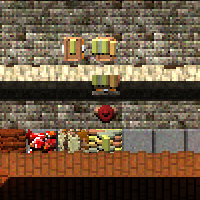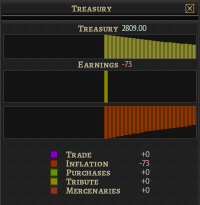Trading: Difference between revisions
No edit summary |
|||
| Line 3: | Line 3: | ||
Every type of resource has an unfixed value, that differs between settlements. The rarer and more valuable the resource, the more expensive it will be. Players will receive the amount of resources depending on the value and amount of what they gave. For example, if a player loads 128 units of wood into a trade depot at a value of 15 per unit (which would equal 1920 in total), and the player wanted to receive [[metal]], which for example had a value of 107. This means that once the trader collects all 128 units of wood, the player will receive 17 units of metal from the trader, which would be 1819 in value. This is because the metal units would equal as close to that 1920 without going over.<sup>''[citation needed]''</sup> | Every type of resource has an unfixed value, that differs between settlements. The rarer and more valuable the resource, the more expensive it will be. Players will receive the amount of resources depending on the value and amount of what they gave. For example, if a player loads 128 units of wood into a trade depot at a value of 15 per unit (which would equal 1920 in total), and the player wanted to receive [[metal]], which for example had a value of 107. This means that once the trader collects all 128 units of wood, the player will receive 17 units of metal from the trader, which would be 1819 in value. This is because the metal units would equal as close to that 1920 without going over.<sup>''[citation needed]''</sup> | ||
There's no actual physical money or currency in the game such as paper bills or currency, as everything is done by trading, with the values of resources acting as the closest thing to currency. Trade carts can be seen moving from | There's no actual physical money or currency in the game such as paper bills or currency, as everything is done by trading, with the values of resources acting as the closest thing to currency. Trade carts can be seen moving from region to region in the [[world]] view; this can be very helpful in planning out trading times. | ||
== Treasury == | == Treasury == | ||
Revision as of 02:29, 6 July 2021

Trading is the process of giving resources in order to collect resources, in other words, it's simply bartering with other civilizations. This is very useful in obtaining a resource that is not within reach of your settlement. In order for trading to work, at least one export depot and one import depot must be built. The player can choose which resources are given and received. Resources from the player's settlement must be placed in the export depot, then once a trader arrives and collects the player's resources from this, they will deliver the chosen resource to the import depot. Much like warehouses, resources can be stored in multiples of 128.
Every type of resource has an unfixed value, that differs between settlements. The rarer and more valuable the resource, the more expensive it will be. Players will receive the amount of resources depending on the value and amount of what they gave. For example, if a player loads 128 units of wood into a trade depot at a value of 15 per unit (which would equal 1920 in total), and the player wanted to receive metal, which for example had a value of 107. This means that once the trader collects all 128 units of wood, the player will receive 17 units of metal from the trader, which would be 1819 in value. This is because the metal units would equal as close to that 1920 without going over.[citation needed]
There's no actual physical money or currency in the game such as paper bills or currency, as everything is done by trading, with the values of resources acting as the closest thing to currency. Trade carts can be seen moving from region to region in the world view; this can be very helpful in planning out trading times.
Treasury


At the top-left of the screen, there is a button that shows the treasury of the player's settlement, the accumulated value of goods as well as expenses that were traded can be seen. The amount in the treasury and expenses is recorded every 4-12 within each year.
Toll - How much is spend/earned on toll. Toll is payed when you buy goods. It is gained by having caravans on the world map pass through your kingdom.
Trade - Profits/losses due to trade.
Inflation - Infliation is applied to positive and negative treasuring. Each year a negative treasury will have 10% of its debt removed . A positive treasury will have 10% removed.
Purchases - Special purchases/sales such as from the slave trader.
Tribute - Denari/spent/gained from paying off other armies and factions.
Mercenaries - Mercenaries can be conscripted into your armies and cost credits to upkeep each day.